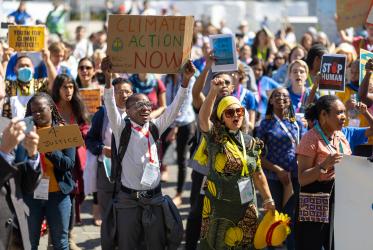In 2019, the United States was in the midst of a viral debate on the use of plastic straws. Local and state governments issued bans, reusable straws were flying off of the shelves, and conservative media was crying about the “liberal hysteria” all around. Straws became a litmus test for environmental responsibility and care.
There was one issue though. How much was one person’s use of a plastic straw really impacting the environment? Too often, problems like climate change are framed as a matter of personal responsibility, strategically ignoring the fact that industries and governments have been the leading cause of carbon emissions and pollution.
At the 2023 WCC Eco School on climate, water, food, and health justice, we discussed this very dynamic. I soon learned that despite other countries of the global north having better climate policies than my home country, the US, the distracting issue of personal choice exists in all of them.
Further, we recognized the reason for this distraction is greed. We named how British Petroleum coined the term “carbon footprint” to scrutinize the individual impact on climate change, all while continuing their planet-destroying operations. It gets even more outrageous to frame individual choice as the problem when 125 billionaires and their investments contribute an equivalent amount of emissions to the nation of France.
It is greed that asks the majority of the population to cut back on their carbon footprint while seeing record profits. It is greed that hoards wealth and resources while committing the worst carbon emissions.
After the completion of the Eco School, I still find myself asking, what can I do in the face of such greed? While making individual choices to reduce our impacts are great, in the end, if I were to disappear tomorrow, my climate impact would be negligible. Systemic greed would prevail.
So the question has to be more than an individual question. It should be what can our churches, our denominations, our ecumenical movement, and our interfaith movement do?
What can we do as a global society to change our systems and our world? This is what I believe is the real challenge of the Eco School. What are we doing after it is complete?
The eco ambassadors from this year’s Eco School are starting with a variety of local projects. Currently in my community, I am in the process of building an Environmental Justice Taskforce within the Michigan Conference of the United Methodist Church.
The Michigan Conference of the United Methodist Church has a strong history of seeking justice through its ministry. However, there has not been a group specifically focused on environmental justice.
Yet, the needs in our community are great. Michigan is home to 20% of the earth’s fresh water in the Great Lakes, a vibrant abundance of forest and agriculture, and a place that is well-suited to be a beacon of light for climate refuges escaping the crisis we have caused in other parts of the world.
But corporate greed threatens these resources. We have people struggling to access safe drinking water in places like Flint, Michigan while Nestle paid $200 a year from 2019 to 2021 to pump 1.1 million gallons of water per day for bottling just 97 miles (156 km) away. Canadian oil giant Enbridge also threatens these resources by operating a dangerous and highly-contested crude oil pipeline through the second largest Great Lake, threatening regional freshwater resources for generations to come.
Organizing and advocacy are critically necessary in our region and the church must be a part of this work. It is my hope that the Environmental Justice Taskforce can bring healing to the damage we have already caused as well as organize and advocate to end the damage we continue to create.
While the Eco School is only a one-week program, the work of environmental advocacy continues far beyond. I am proud to be a part of this group of young people committed to resisting greed and fighting for a livable planet. We have far to go, but I am grateful to be in their company in the work ahead.
Engaging climate justice: WCC Eco-School - blog post by Conor Russel, 6 December 2023



